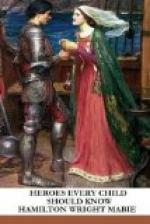“They shall not pass these gates,” answered the knight, sternly, and he entered the hall alone, where the monks were sitting at meat, and knelt down and bowed to them.
“I have come back, my lord,” he said to the Abbot, who had just returned from the court. “I have come back this day as I promised.”
“Have you brought my money? What do you here without it?” cried the Abbot in angry tones.
“I have come to pray you for a longer day,” answered the knight, meekly.
“The day was fixed and cannot be gainsaid,” replied the Justiciar; “I am with the Abbot.”
“Good Sir Abbot, be my friend,” prayed the knight again, “and give me one chance more to get the money and free my lands. I will serve you day and night till I have four hundred pounds to redeem them.”
But the Abbot only swore a great oath, and vowed that the money must be paid that day or the lands be forfeited.
The knight stood up straight and tall: “It is well,” said he, “to prove one’s friends against the hour of need,” and he looked the Abbot full in the face, and the Abbot felt uneasy, he did not know why, and hated the knight more than ever. “Out of my hall, false knight!” cried he, pretending to a courage which he did not feel. But the knight stayed where he was, and answered him, “You lie, Abbot. Never was I false, and that I have shown in jousts and in tourneys.”
“Give him two hundred pounds more,” said the Justiciar to the Abbot, “and keep the lands yourself.”
“No, by Heaven!” answered the knight, “not if you offered me a thousand pounds would I do it! Neither Justiciar, abbot, nor monk shall be heir of mine.” Then he strode up to a table and emptied out four hundred pounds. “Take your gold, Sir Abbot, which you lent to me a year agone. Had you but received me civilly, I would have paid you something more.
“Sir Abbot, and ye men
of law,
Now have I kept my day!
Now shall I have my
land again,
For aught that you may
say.”
So he passed out of the hall singing merrily, leaving the Abbot staring silently after him, and rode back to his house in Verisdale, where his wife met him at the gate.
“Welcome, my lord,”
said his lady,
“Sir, lost is all your
good.”
“Be merry, dame,”
said the knight,
“And pray for Robin
Hood.
But for his kindness, we would have been beggars.”
After this the knight dwelt at home, looking after his lands and saving his money carefully till the four hundred pounds lay ready for Robin Hood. Then he bought a hundred bows and a hundred arrows, and every arrow was an ell long, and had a head of silver and peacock’s feathers. And clothing himself in white and red, and with a hundred men in his train, he set off to Sherwood Forest.




